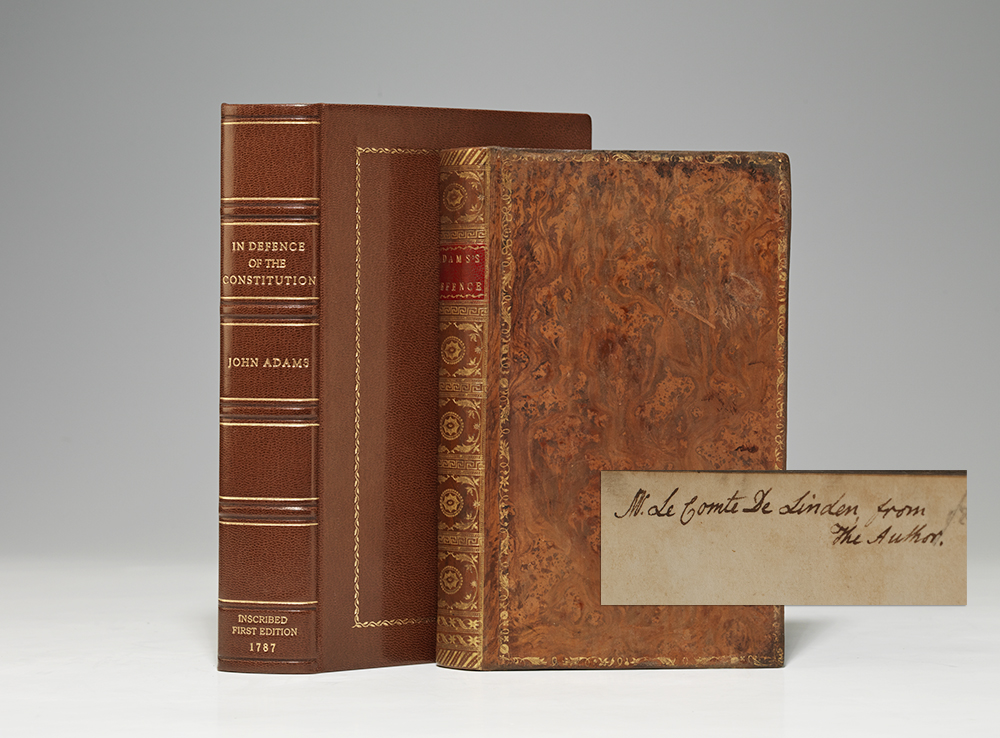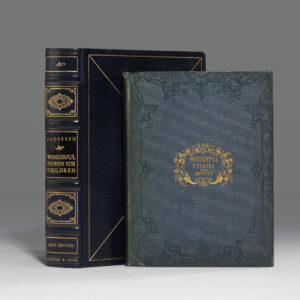Description
“LIBERTY AND THE LAWS DEPEND ENTIRELY ON A SEPARATION OF [POWERS]”: VERY RARE INSCRIBED PRESENTATION FIRST EDITION OF JOHN ADAMS’ IMPORTANT 1787 DEFENCE OF THE CONSTITUTIONS OF THE UNITED STATES
ADAMS, John. A Defence of the Constitutions of Government of the United States of America. London, 1787. Octavo, contemporary full marbled calf sympathetically rebacked with elaborately gilt-decorated spine, morocco spine label.
Very rare inscribed presentation first edition of Adams’ important work on constitutional separation of powers, his reasoned yet impassioned “rendition of the case for checks and balances in government” that influenced the debate over the federal constitution. This copy inscribed by Adams on the front flyleaf: “M. Le Comte de Linden, from the Author.” Adams published this book in London while serving there as the U.S. minister to Great Britain, and the recipient was a Dutch diplomat and friend of Adams who was serving as Holland’s minister to Britain during this same period and is frequently mentioned in Adams’ diary and letters.
Adams’ Defence is “his landmark sourcebook on tripartite federal government… Adams’ opening salvo of the Defence pieced together or silently quoted from historical examples, mainly drawn from case studies of Italian republics, to demonstrate that balanced government prevented civil war. Adams wrote that America required such a structure in order to nurture and refine the classical ideals of democracy. As a leading federalist he argued in the Defence and throughout his political life that American government must distribute power evenly among the democratic, aristocratic, and monarchic/executive branches. In his consideration of the rise of political parties, and in his broadening of American governmental structure beyond the basic tenets of British constitutionalism, Adams’ Defence made a provocative argument that resonated with the popular call to reform the weak Articles of Confederation… The Defence’s opening volume served to articulate and disseminate John Adams’ belief that Americans must combine precepts of classical republicanism and English constitutionalism in order to build a balanced, tripartite government. The first volume of the Defence, which proved formative in shaping and reinforcing public opinion at a crisis point of constitutional reform, also reintroduced Adams to American citizens as an ardent federalist thinker” (Papers of John Adams, Vol. 18: 546-550).
Adams’ Defence has been described as “perhaps the most important work of American political thought prior to The Federalist. It ranks in significance with three other 18th-century literary works published originally in Europe by eminent Americans, Benjamin Franklin’s Memoirs, Thomas Paine’s Age of Reason, and Thomas Jefferson’s Notes on Virginia” (Aldridge, 91). “When he began to write, both sides of the Atlantic were stirring with great events. Holland was already in the first of a series of revolutions,… France was tottering on the brink of revolution, and popular upheaval seemed to threaten the new governments in America. The composition of the Defence owes a great deal to the sense of crisis that Adams felt as he viewed these political and social convulsions… [Defence] may well be one of the most important reformulations of the theory of mixed and balanced government since Aristotle’s Politics. That’s certainly how many reform liberals in Europe and America saw the Defence” (Thompson, 237-256).
Adams distributed copies of this volume (a complete work in itself) to friends and influential acquaintances in Europe and in America, where it influenced the debate over the federal constitution and its ratification. He was “the most often cited and quoted American authority on constitutional government at the time the constitution was written and ratified… the first volume of his Defence… appeared just in time to guide the deliberations of the United States Constitutional Convention. Adams’ Defence articulated the American version of republicanism that prevailed in the new state and federal constitutions. Supporters of the new forms of government praised Adams, and quoted him approvingly. Opponents of the United States Constitution attacked Adams, and criticized his writings” (Sellars, 220). “A work marked by insight, breadth of views, conviction, courage, and—we may venture to add—much wisdom” (Larned 2287).
The work was popular and American reprints appeared the same year in New York and Philadelphia (See Evans 20176, 20177). The following year Adams extended this standalone work by writing a second and third volume, and the entire work was reissued in London in 1788 under a slightly expanded title. Howes A60. Sabin 233. See Harvard Law Catalogue I:13. The recipient of this inscribed presentation copy almost surely was Adams’ friend, a Dutch diplomat frequently mentioned in Adams’ diary and letters (as Comte de Linden, Baron de Linden or Lynden, and other name variations), identified by the editors of Adams’ papers as Baron Dirk Wolter de Lynden van Blitterswyck. Lynden was Holland’s envoy to Sweden from 1778 to 1782 and Holland’s minister to Great Britain from 1784 to 1788. Adams became the U.S. minister to Great Britain in 1785, and he asked Lynden for advice on diplomatic protocol at the Court of St. James. Adams and Lynden both held their positions in London when the book was published there in January 1787 and until 1788, so the book was likely inscribed by Adams during that period. Adams noted visits and described conversations with Lynden in his diary, and in letters to others he praised and called him a friend. Adams wrote in 1782 to Robert Livingston: “There is a Nobleman, the Baron de Linden, who belongs to the Province of Zealand, and was formerly Ambassador in Sweden… I have had the pleasure of a great deal of Conversation with him and his advice has been usefull to me. He is a sensible and worthy man and his Sentiments are very just.” In a 1785 letter to C.W.F. Dumas, Adams referred to “our friend the Baron De Linden, whom I always esteemed and in whom I have found Since I have been here, more estimable Qualities than ever. Sensible, judicious and attentive, as a publick Minister, and friendly and obliging as a private Gentleman.” Expert restoration to board extremities. A very good copy in contemporary calf, most rare and desirable presented by Adams.


